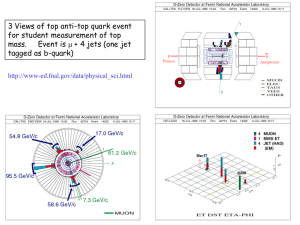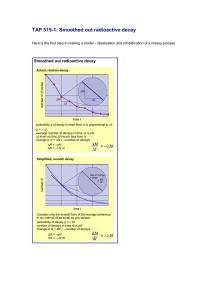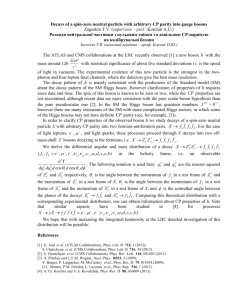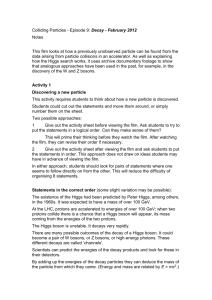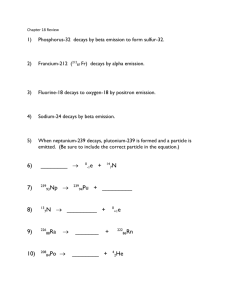The decays of a neutral particle with zero spin and arbitrary CP
advertisement
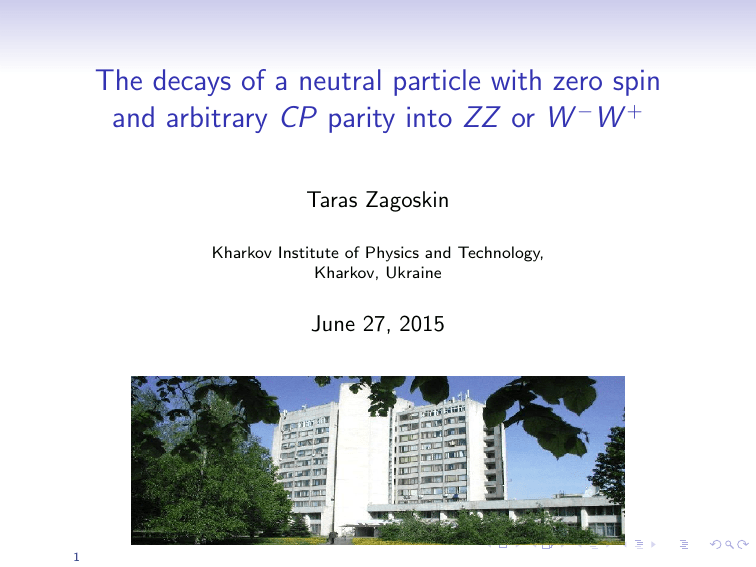
The decays of a neutral particle with zero spin and arbitrary CP parity into ZZ or W − W + Taras Zagoskin Kharkov Institute of Physics and Technology, Kharkov, Ukraine June 27, 2015 1 Introduction • In 2012 the ATLAS and CMS collaborations observed a boson h with the mass around 126 GeV. We call this particle the Higgs boson. However, clarification of properties of the observed boson h requires more data. qh = 0 Sh = 0 or Sh = 2 (very unlikely ) CPh =? • In the SM for the Higgs boson q = 0, S = 0, C = P = 1, but some supersymmetric extensions of the SM assume existence of Higgs bosons with negative or indefinite CP parity. 2 Plan of the investigation In order to clarify the CP properties of h the following way has been chosen. • We consider the decay X → Z1∗ Z2∗ → f1 f¯1 f2 f¯2 , where X is a neutral particle with zero spin and arbitrary CP parity, f1 6= f2 . 3 Plan of the investigation AX →Z1∗ Z2∗ ∼a(e1∗ · e2∗ ) + c b (e1∗ · p2 )(e2∗ · p1 ) + i 2 εµνρσ (p1µ + p2µ )(p1ν − p2ν )e1∗ρ e2∗σ mX2 mX e1 and e2 are the polarization 4-vectors of Z1∗ and Z2∗ respectively. a, b, c are complex-valued functions of the masses of Z1∗ and Z2∗ . These functions characterize the CP properties of the boson X . At tree level CPX 1 1 (SM) -1 indefinite a any 1 0 6= 0 any b any 0 0 any 6= 0 c 0 0 6 0 = 6= 0 6= 0 • We derive the full distribution of the decay X → Z1∗ Z2∗ → f1 f¯1 f2 f¯2 . • Experimentalists measure an experimental full distribution of this decay for X = h. • Comparing the theoretical and experimental distributions, one can get constraints on the values of a, b, c at various masses of Z1∗ and Z2∗ . 4 Definitions of θ1 , θ2 , ϕ θ1 is the angle between the momentum of Z1∗ in a rest frame of X and the momentum of f1 in a rest frame of Z1∗ , θ2 is the angle between the momentum of Z2∗ in a rest frame of X and the momentum of f2 in a rest frame of Z2∗ , ϕ is the azimuthal angle between the planes of the decays Z1∗ → f1 f¯1 and Z2∗ → f2 f¯2 . 5 Definitions of A0 , Ak , A⊥ Moreover, it is convenient to write down the fully differential width by means of the following amplitudes: 2 λ(mX2 , a1 , a2 ) m X − a1 − a2 +b , A0 ≡ − a √ √ 2 a1 a2 4mX2 a1 a2 √ Ak ≡ 2a, A⊥ ≡ √ 1 2c λ 2 (mX2 , a1 , a2 ) . mX2 aj is the mass squared of Zj∗ , i.e. the invariant mass of the pair fj f¯j , λ(x, y , z) ≡ x 2 + y 2 + z 2 − 2xy − 2xz − 2yz. 6 The differential width with respect to a1 , a2 , θ1 , θ2 , ϕ Using approximations mf1 = mf2 = 0, we have derived that d 5Γ =|A0 |2 f1 + (|Ak |2 + |A⊥ |2 )f2 + (|Ak |2 − |A⊥ |2 )f3 da1 da2 dθ1 dθ2 dϕ + Re(A∗0 Ak )f4 + Re(A∗0 A⊥ )f5 + Re(A∗k A⊥ )f6 + Im(A∗0 Ak )f7 + Im(A∗0 A⊥ )f8 + Im(A∗k A⊥ )f9 . f1 , f2 , ..., f9 depend on a1 , a2 , θ1 , θ2 , ϕ, but they are independent of a, b and c. The dependence of the fully differential width on the couplings a, b and c is concentrated in nine quadratic combinations of the amplitudes A0 , Ak , A⊥ . How many decays should be measured for obtaining a precise enough experimental full distribution of the decay? d n Γ ↔ 10n+1 decays d 5 Γ ↔ 106 decays How many decays have been observed? h → Z1∗ Z2∗ → e − e + µ− µ+ 26 decays (ATLAS and CMS together after about 1.5 years of measurements) 7 Distributions of four and less variables should be considered We will probably have a precise enough experimental full distribution in 60000 years (roughly). That is why we should try to get constraints on a, b, c by means of measuring distributions of as little a number of variables as possible. 8 a1 a2 -differential width 2 Γ Figure: dad1 da of the decay X → Z1∗ Z2∗ → l1− l1+ l2− l2+ as a function of 2 √ √ a1 , a2 , if X is the SM Higgs boson and mX = 125.7 GeV. l1 , l2 = e, µ, τ, l1 6= l2 . 9 a2 -differential width Integrating d2Γ da1 da2 approximately, we derive that √ 3 9 1 2 , m2 , a )a 2GF mZ λ 2 (mX dΓ 2 2 2 2 2 2 Z ≈ (a + v )(a + v ) f1 f1 f2 f2 3 2 4 da2 288π mX ΓZ (a2 − mZ )2 + (mZ ΓZ )2 q √ ∀a2 | 2mf2 < a2 ≤ mX − mZ2 + 3mZ ΓZ . X λ=0,k,⊥ af and vf are constants depending on a fermion f , A0λ ≡ Aλ |a1 =m2 . Z In several articles the formula for approximation when dΓ da2 √ and their approach is inaccurate. q mh − mZ2 + 3mZ ΓZ ≈ 30.8 GeV mh − mZ ≈ 34.5 GeV 10 has been used in the narrow-Z -width a2 ≤ mX − mZ , |A0λ |2 Relations between the helicity coefficients and observables We call the ratios of the nine quadratic combinations of the fully differential P d5Γ , width to λ=0,k,⊥ |Aλ |2 ‘the helicity coefficients’. Integrating da1 da2 dθ 1 dθ2 dϕ we can relate all the helicity coefficients to observables. For example, π −1 Z2 Zπ 0 2 2 Re(A0∗ dΓ d Γ d Γ k A⊥ ) (1,2) O1 (a2 ) ≡ − dθ1,2 dθ1,2 ∼ P 0 2 da2 da2 dθ1,2 da2 dθ1,2 λ |Aλ | 0 = π 2 0 Re(Fk0∗ F⊥ ). A0 Fλ0 ≡ pP λ , λ = 0, k, ⊥ . 2 λ |Aλ | 11 Relations between the helicity coefficients and observables (1,2) (a2 ) ∼ (1,2) (a2 ) ∼ O1 O2 O3 (a2 ) ∼ O4 (a2 ) ∼ O5 (a2 ) ∼ O6 (a2 ) ∼ (1,2) O7 (a2 ) ∼ (1,2) O8 (a2 ) ∼ O9 (a2 ) ∼ 12 Re(Fk0∗ F⊥0 ) 0 2 |F0 | 0 2 0 2 |Fk | + |F⊥ | 0 2 0 2 |Fk | − |F⊥ | 0∗ 0 Im(Fk F⊥ ) → Constraints on a, b, c Re(F00∗ Fk0 ) 0∗ 0 Im(F0 Fk ) 0∗ 0 Re(F0 F⊥ ) 0∗ 0 Im(F0 F⊥ ) Conclusions • In order to clarify the CP properties of the Higgs boson we have considered the fully mass and angular differential width of the decay X → Z1∗ Z2∗ → f1 f¯1 f2 f¯2 , where X is a neutral particle with zero spin and arbitrary CP parity, f1 6= f2 . • Limits of applicability of approximations used when deriving various differential widths are established. • All the helicity coefficients are related to observables. We have also plotted the observables and determined what constraints on a, b, c can be put by them. • We should wait for experimentalists measuring the observables (1,2) O1 , O2 , ..., O9 and then get constraints on a, b, c using the (1,2) shown relations between F00 , Fk0 , F⊥0 and O1 , ..., O9 . • An analogous analysis has been carried out for the decay X → W −∗ W +∗ → f1− f¯2− f¯1+ f2+ . The presentation is based on the paper Zagoskin and Korchin, arXiv:1504.07187. 13
